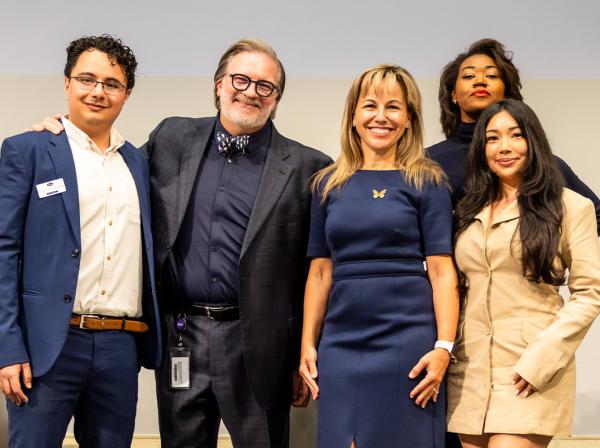Doctoral Cohort of Inspiring Leaders Makes History
When Daniel Guerrero logged into his doctoral research course for the first time since George Floyd was murdered in May 2020, the tension in the virtual room was palpable. He and his classmates had started their Ed.D. program at St. Edward’s University during a time of social upheaval. The program launched in Fall 2019, and since then the nation had learned of the police killings of Atatiana Jefferson, Breonna Taylor, and now Floyd, as well as the onset of the Covid-19 pandemic and economic turmoil. The faces of his classmates — all skin tones, all ages, all genders — reflected the anger and grief he felt.
When all the students had arrived in the virtual classroom, Professor Tom Sechrest began. “We’re not going to worry about what’s on the syllabus for today,” he said. “We’re going to have a moment of silence and reflection, and then I want you to speak what’s on your heart and mind. Today’s conversation is going to be about what it means to be human; what it means to be a person of color in our society; and how we as leaders can create positive change.”
What followed was a raw, heartfelt, respectful conversation that Guerrero remembers as one of the most inspirational classes he’d ever attended. “It brought our entire class to a different level of vulnerability and cohesion than any other team in my entire life, and it was what we needed at that moment,” he says. “And to receive that from a leader like Dr. Sechrest was tremendously informative, and a great demonstration of what it means to be a leader of people. Those conversations have influenced how I approach my own students.”
In December 2022, Guerrero graduated from St. Edward’s with his Doctorate of Education in Leadership and Higher Education. He now chairs the MBA program at Concordia University Texas, where he applies the lessons from his coursework and from the leadership that Sechrest and his other professors modeled in the classroom.
Guerrero was one of the initial seven students to complete the Ed.D., the first-ever doctoral program at St. Edward’s. More than 80 students are currently enrolled in the program, which prepares graduates for leadership positions in higher education as well as corporate training, talent management and the nonprofit world.
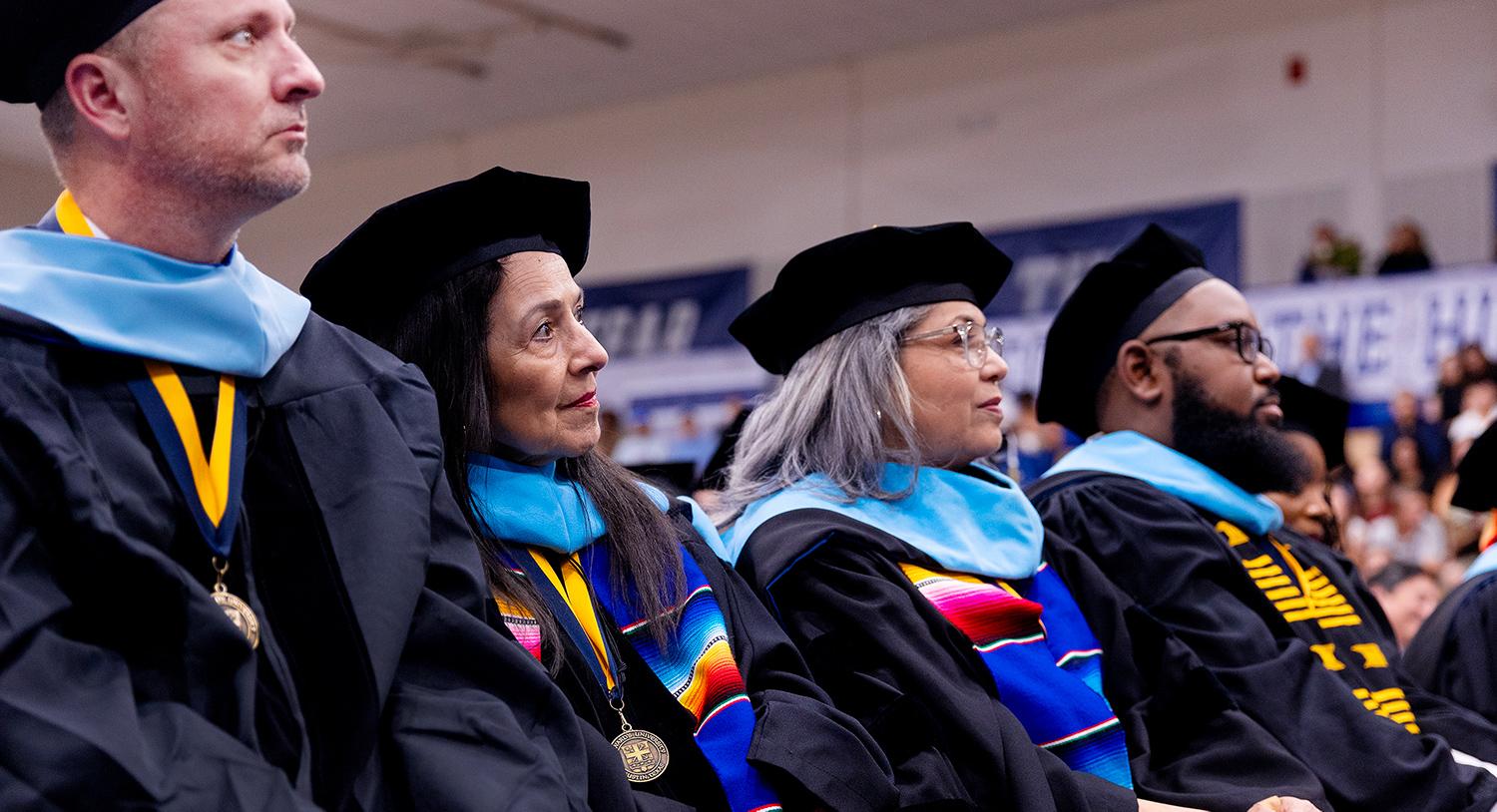
The most senior administrators on college campuses today have witnessed massive changes in higher education during their careers. New technology, a more diverse student population, a sharper focus on mental health, and an emphasis on career outcomes — among other factors — have dramatically reshaped the modern university.
“There’s going to be a huge demographic shift as Baby Boomers exit their roles in higher education,” says Sechrest, the program’s director. “It’s a different kind of world, and the needs of college students are changing, and leaders need to be consciously aware of those needs.”
“It’s a different kind of world, and the needs of college students are changing, and leaders need to be consciously aware of those needs.”
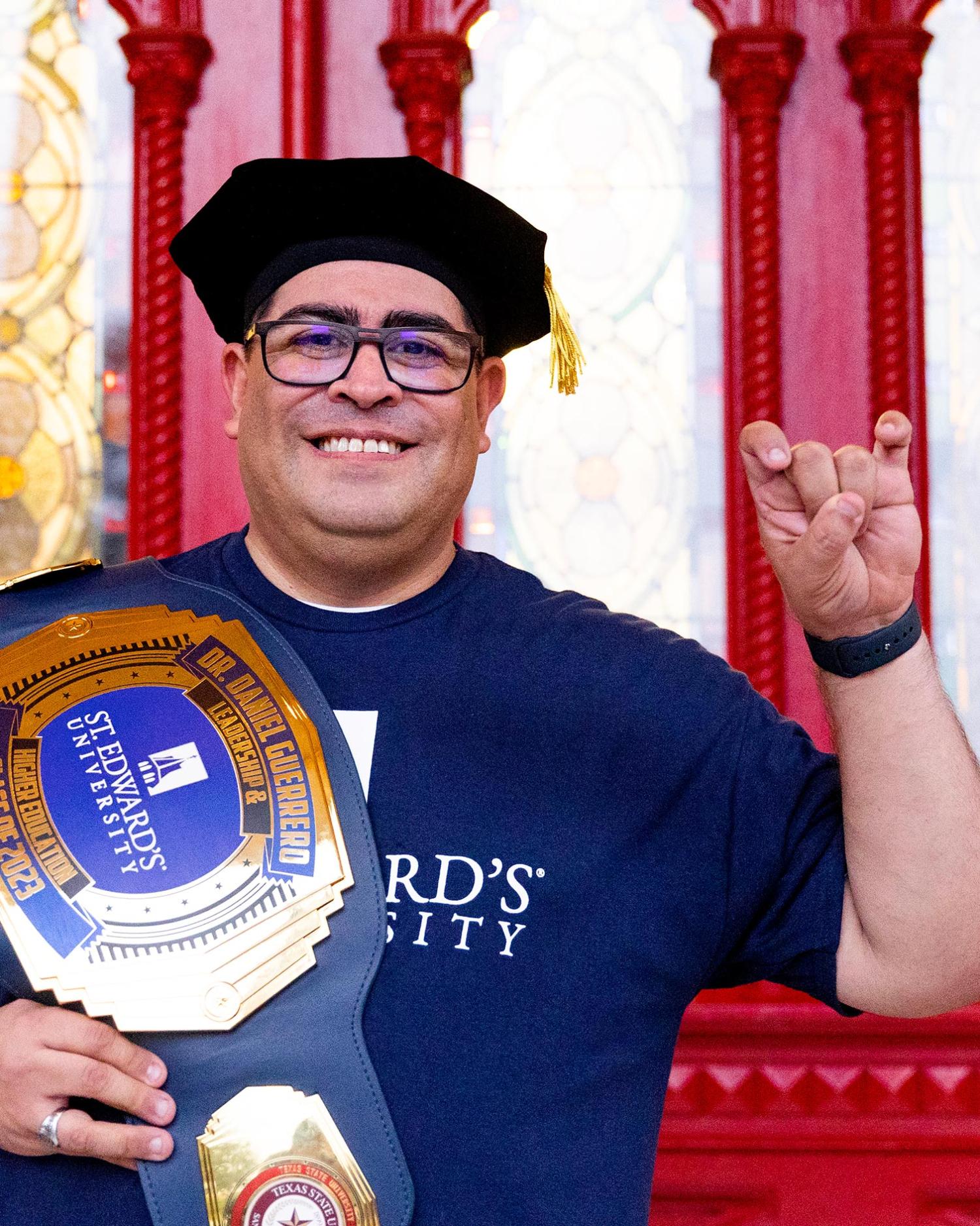
St. Edward’s is preparing this next generation of leaders through its doctoral program, a three-year, online curriculum that centers practice-based research, social justice and community. The doctorate is a professional degree focused on contemporary challenges in higher education and organizational leadership. Because the program is designed for working adults, students are able to apply what they learn immediately.
“I was fortunate to be able to experiment with what I learned the very next day in my classrooms,” says Guerrero, who taught at two Central Texas universities while earning his Ed.D. “Often it had less to do with a book or an assignment than with how my instructor from that week modeled a particular behavior — what they did to motivate me to dig deeper in an assignment, or how they kept my attention online. I tried to practice those skill sets in a way that resonated with the students I was teaching, both in person and virtually.”
The entire program is designed to be completed in 10 semesters over three years. Students take classes together as a cohort before choosing a concentration in either Higher Education or Organizational Leadership and Change. The curriculum was designed to be online — from the beginning, rather than in response to the pandemic. Classes meet weekly for lecture and discussion, and students convene for further discussion or group work on their own time, building a community.
“Our students have said, ‘I feel really close to my classmates,’ even though they only interact with each other online,” Sechrest says.
Students write what’s called a practice-based dissertation: rather than conducting experimental research or developing theory, they examine a practical issue in postsecondary education, conduct a literature review and qualitative research, and make recommendations for addressing the issue. Instead of saving the dissertation until the end of the program, the Ed.D. has students complete it concurrently with their coursework. In fact, early in the program, a course called Demystifying Doctoral Research and Writing explains how to approach each chapter.
“The program was built for you not to fail,” says Darius Jones, who also graduated in December.
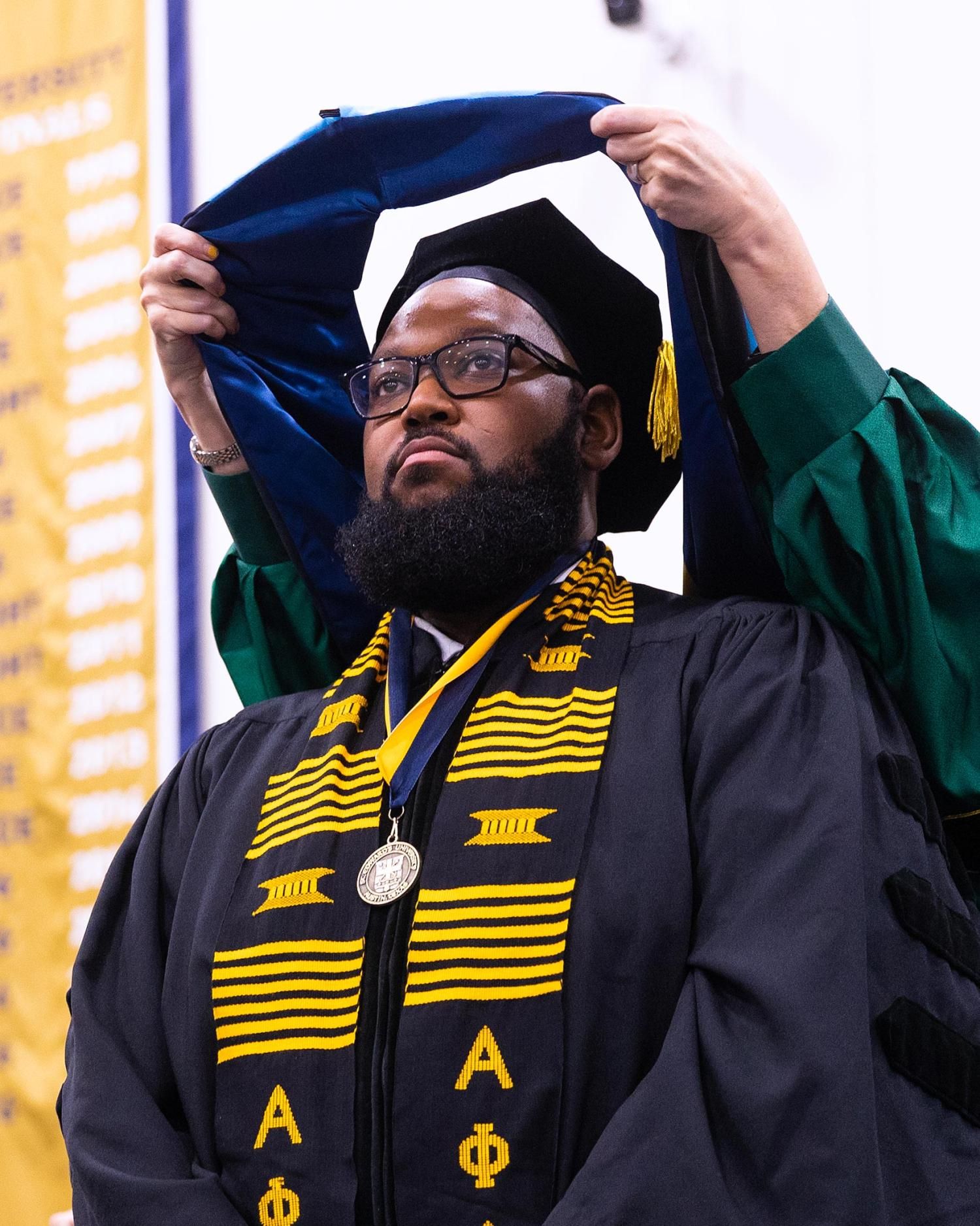
In his dissertation, Jones studied students of color who join historically white Greek-letter organizations. Since his days working in fraternity and sorority life at a state school, he had wondered why nonwhite students chose to join these organizations rather than a culturally based Greek organization. Through interviews with alumni, he learned that the historically white Greek groups did things that appealed to students of color: they were highly visible on campus, were transparent about their recruitment process, offered appealing community service events and worked with leadership development consultants. Jones concluded that culturally based sororities and fraternities could adopt some of these same practices to ensure that students of color were aware of all their options before going through recruitment.
Guerrero, a former mayor of the city of San Marcos, focused his dissertation on peer mentoring within the San Marcos Fire Department. He interviewed firefighters about their observations of mentoring behaviors and analyzed their feedback. Guerrero concluded that the department was doing a good job matching mentors and mentees, but that the pairs needed more time to forge a connection. In response to his work, city leaders moved to streamline reporting requirements so firefighters would have fewer data entry tasks and more time to focus on the mentor relationship.
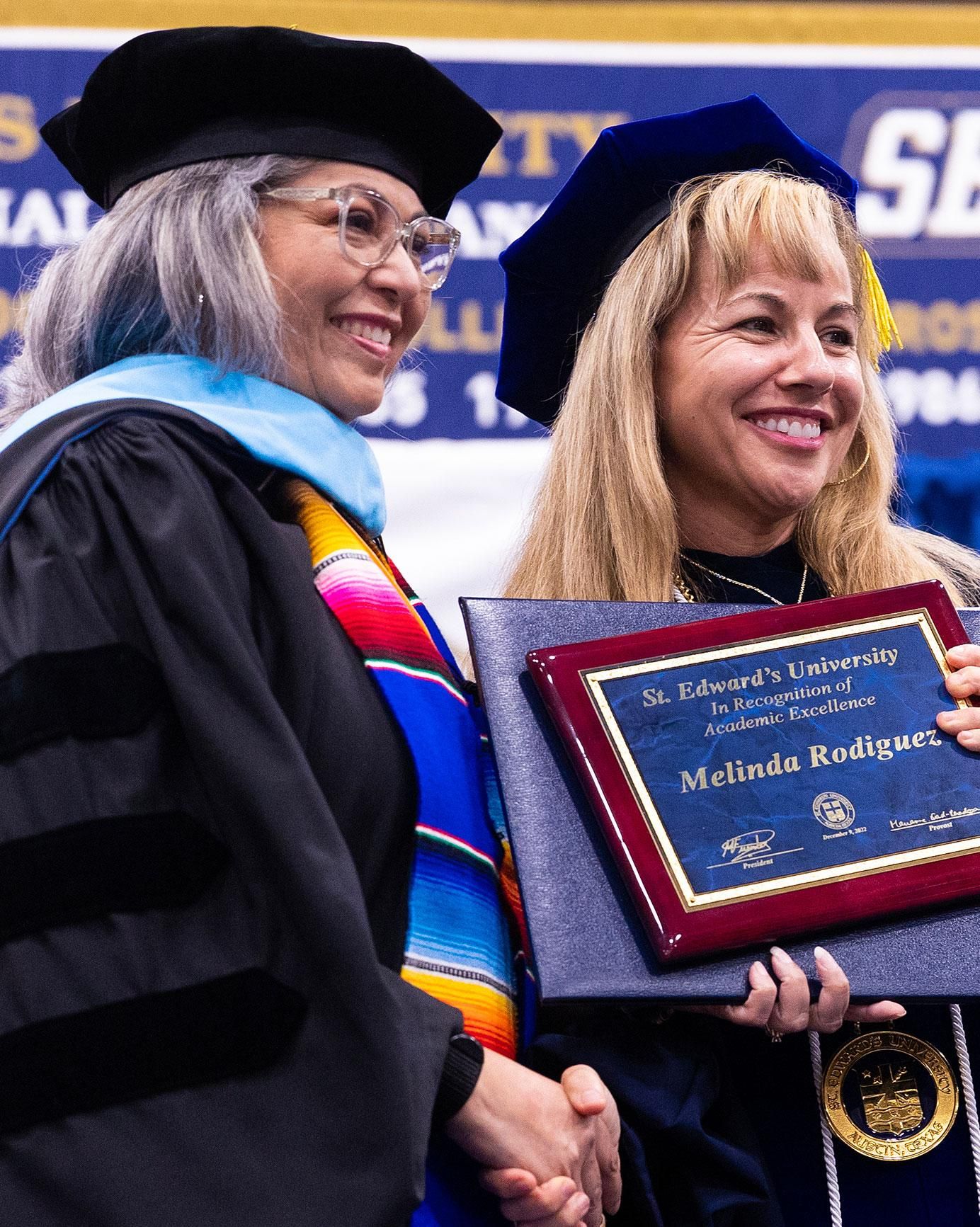
A third December graduate, Melinda Rodriguez, interviewed Latina leaders from different sectors to understand how cultural intelligence has impacted their leadership journeys. Her research was a departure from early social science research on cultural intelligence, which predominantly focused on expatriate adaptation in cross-cultural settings. “The leadership skills that are needed in the current workspace — particularly post pandemic — are not the hard inspiration, productivity and quality management associated with the Baby Boomer generation,” she says. “Rather, they are empathy, understanding, nurturing and mentoring.” These are the areas where Latina leaders excel.
The Ed.D. program has a strong emphasis on social justice, equity and inclusion. Students spoke of appreciating the diverse community in the program — race, gender, age, professional experience, sexual orientation, geography. This diversity is a hallmark of the educational approach at St. Edward’s, a Catholic university founded by the Congregation of Holy Cross. Other Holy Cross values that shape the program include using both the head and the heart to make decisions; honoring the dignity of the individual; and caring for the whole person. Students say that professors understood that they had lives and identities outside of school — as employees, parents and caregivers — and supported them through personal challenges, including the impact of social upheaval.
“We were able to show up as ourselves, and I appreciated that.”
“Several cataclysmic things happened in society throughout the course of this program,” Rodriguez says. “Not only a pandemic, but we had great civil unrest. And so many times our professors would begin class with giving everyone the space to just process what was happening. Professors allowed us to be human and to express what we were feeling, and it was given space and respected.”
The community the students had built helped them persevere through both academic and personal challenges.
“As a first-generation college student, this was all new to me, and there were many times where I questioned myself and imposter syndrome crept up,” Jones says. “But what really kept me grounded was the community I built with my cohort.”
“We were able to show up as ourselves, and I appreciated that,” he says. “You didn't have to fit a certain mold of what academia views as a scholar. This program accepted us for who we were. We were able to shift the culture of what academia can look like.”

